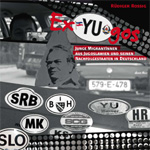Rüdiger Rossig | Journalist | Novinar
Overcoming Distrust
How Francois Mitterrand and Helmut Kohl drove the European Community forward | By Rüdiger Rossig
On Sept. 22, 1984, Helmut Kohl and Francois Mitterrand met in a field near Verdun, France. More than 300,000 German and French soldiers lost their lives there in 1916, during one of the bloodiest battles of the First World War. The photo of the German chancellor and the French president, holding hands during their shared moment of silent commemoration of the dead, is the best representation of the reconciliation of the two European countries that had long viewed each other as archenemies.
Kohl and Mitterrand were very similar and at the same time very different as politicians. Massive Helmut Josef Michael Kohl, almost 6 feet 6 inches tall, was born in Ludwigshafen on April 3, 1930, the second son of a tax inspector. He later described the political views of his parents as “Catholic but at the same liberal and moderately nationalistic.”
Kohl’s older brother Walter was killed shortly before the end of the Second World War. This loss made a lasting impression on the future German chancellor. In 1944, when he was only 14, he was drafted into military service in the area of anti-aircraft support. However, he did not have to fight. Later, he termed this the “the grace of being born later.”
Kohl’s political career began in 1946 when he became a member of the Christian Democratic Union (CDU). Under the leadership of Konrad Adenauer, this party was able to unite the middle class center in the Western zones of divided Germany, which had been split into Lutheran and Catholic groups until then. The CDU was able to remain the governing political power for more than two decades.
Kohl developed his desire to walk in the footsteps of the first chancellor of the Federal Republic of Germany early on. He climbed his way up to the top of his party rung by rung: from 1964 on, he was a member of the national executive board of the CDU; in 1966, chairman of the CDU in Rhineland-Palatinate; in 1969, minister president of the federal state of Rhineland-Palatinate where he was born; and in 1973, national chairman of the CDU.
At that time, Kohl’s party had not governed for four years. He fought for nine years to lead the CDU back into power again, and finally became the German chancellor in 1982. He remained in office for 16 years.
One year before, the French had elected Francois Maurice Mitterrand as president. Born in Jarnac, in the Poitou-Charantes region in eastern France in 1916, Mitterrand grew up in a Catholic conservative family just like Kohl. But unlike the future German chancellor, the rather small future president of France felt more connected to the political left.
In 1939, after finishing his education in sociology, French literature and law in Paris, Mitterrand was drafted into the French army. He ended up as a German prisoner of war but was able to escape. He then worked officially for the Vichy regime, which was collaborating with Nazi Germany.
Secretly, however, Mitterrand maintained contact with the French resistance. This led him to escape to London in the winter of 1943, where he joined the French government-in-exile run by Charles de Gaulle. After the war, he was voted into parliament and held a variety of political offices.
Mitterrand developed into a key adversary of the liberator of France and future French president, de Gaulle. He emerged as the top candidate of the left against the conservative general in the 1965 elections, and was able to garner 44.8 percent of the votes. That was more than respectable, but not enough to attain the presidency.
Mitterrand‘s own analysis of his defeat concluded that France could no longer be won with a fragmented left. He founded the Socialist Party of France (PS), and formed the “Union de la Gauche” (Union of the Left) with the Communist Party (PCF). He finally became president in 1981.
Although Socialist Mitterrand and Christian Democratic Kohl were politically different, they were both staunch Europeans. In Chancellor Kohl, the Frenchman had discovered a German head of state who was in agreement with him on most European political issues. They worked to further the expansion of the European Community and its enlargement into the European Union in the 1980s.
For all his commitment to Europe, Mitterrand was concerned that Germany could become too powerful again. After all, he had experienced the consequences of unchecked German power firsthand during the Second World War. This made it difficult to convince him to agree to German reunification. “I love Germany so much that I am happy to have two of them,” he is reputed to have said.
His opposition to reunification did not have an adverse affect on his friendship with Helmut Kohl or their joint European activities. Both men received the International Charlemagne Prize of the City of Aachen in 1988. Francois Mitterrand, who had cancer, died eight years later.
 Deutsch
Deutsch  Naški
Naški  English
English 
